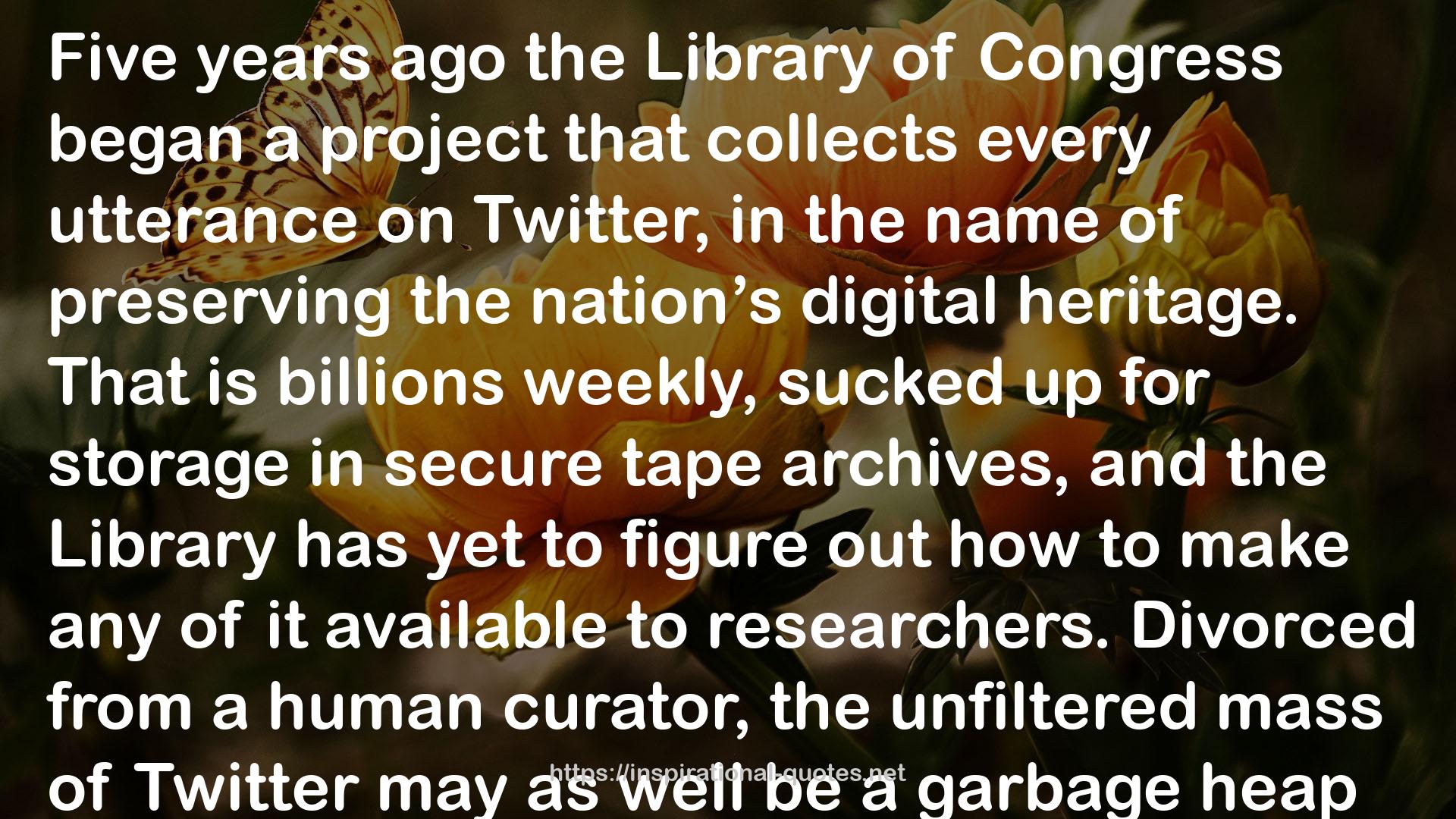James Gleick QUOTES
122 " It may sound ridiculous to say that Bell and his successors were the fathers of modern commercial architecture—of the skyscraper. But wait a minute. Take the Singer Building, the Flatiron Building, the Broad Exchange, the Trinity, or any of the giant office buildings. How many messages do you suppose go in and out of those buildings every day? Suppose there was no telephone and every message had to be carried by a personal messenger? How much room do you think the necessary elevators would leave for offices? Such structures would be an economic impossibility. "
123 " Engineers had not framework for understanding Mandelbrot's description, but mathematicians did. In effect, Mandelbrot was duplicating an abstract construction known as the Cantor set, after the nineteenth-century mathematician Georg Cantor. To make a Cantor set, you start with the interval of numbers from zero to one, represented by a line segment. Then you remove the middle third. That leaves two segments, and you remove the middle third of each (from one-ninth to two-ninths and from seven-ninths to eight-ninths). That leaves four segments, and you remove the middle third of each- and so on to infinity. What remains? A strange "dust" of points, arranged in clusters, infinitely many yet infinitely sparse. Mandelbrot was thinking of transmission errors as a Cantor set arranged in time. "
124 " The past folds accordion-like into the present. Different media have different event horizons—for the written word, three millennia; for recorded sound, a century and a half—and within their time frames the old becomes as accessible as the new. Yellowed newspapers come back to life. Under headings of 50 Years Ago and 100 Years Ago, veteran publications recycle their archives: recipes, card-play techniques, science, gossip, once out of print and now ready for use. Record companies rummage through their attics to release, or re-release, every scrap of music, rarities, B-sides, and bootlegs. For a certain time, collectors, scholars, or fans possessed their books and their records. There was a line between what they had and what they did not. For some, the music they owned (or the books, or the videos) became part of who they were. That line fades away. Most of Sophocles' plays are lost, but those that survive are available at the touch of a button. Most of Bach's music was unknown to Beethoven; we have it all—partitas, cantatas, and ringtones. It comes to us instantly, or at light speed. It is a symptom of omniscience. It is what the critic Alex Ross calls the Infinite Playlist, and he sees how mixed is the blessing: "anxiety in place of fulfillment, and addictive cycle of craving and malaise. No sooner has one experience begun than the thought of what else is out there intrudes." The embarrassment of riches. Another reminder that information is not knowledge, and knowledge is not wisdom. "
125 " As the physicist Murray Gell-Mann once remarked: “Faculty members are familiar with a certain kind of person who looks to the mathematicians like a good physicist and looks to the physicists like a good mathematician. Very properly, they do not want that kind of person around. "
126 " Feynman resented the polished myths of most scientific history, submerging the false steps and halting uncertainties under a surface of orderly intellectual progress, but he created a myth of his own. "
129 " Examined in color through the adjustable window of a computer screen, the Mandelbrot set seems more fractal than fractals, so rich is its complication across scales. A cataloguing of the different images within it or a numerical description of the set's outline would require an infinity of information. But here is a paradox: to send a full description of the set over a transmission line requires just a few dozen characters of code. A terse computer program contains enough information to reproduce the entire set. Those who were first to understand the way the set commingles complexity and simplicity were caught unprepared—even Mandelbrot. "

135 " Another way to speak of the anxiety is in terms of the gap between information and knowledge. A barrage of data so often fails to tell us what we need to know. Knowledge, in turn, does not guarantee enlightenment or wisdom. (Eliot said that, too: “Where is the wisdom we have lost in knowledge? / Where is the knowledge we have lost in information?”) It is an ancient observation, but one that seemed to bear restating when information became plentiful—particularly in a world where all bits are created equal and information is divorced from meaning. The humanist and philosopher of technology Lewis Mumford, for example, restated it in 1970: “Unfortunately, ‘information retrieving,’ however swift, is no substitute for discovering by direct personal inspection knowledge whose very existence one had possibly never been aware of, and following it at one’s own pace through the further ramification of relevant literature.” He begged for a return to “moral self-discipline. "
